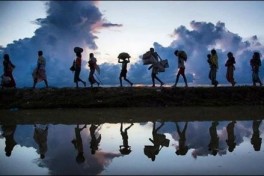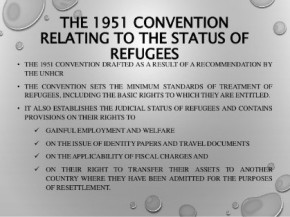Each year, millions of people are forced to flee their homes to escape violent conflict,  persecution, or natural disaster. Some of the people cross the borders of their countries, while many end up in camps within their countries. Whether displaced within or outside one’s country, people on the move face untold hardships.
persecution, or natural disaster. Some of the people cross the borders of their countries, while many end up in camps within their countries. Whether displaced within or outside one’s country, people on the move face untold hardships.
The United Nations observes 20 June as World Day for Refugees. According to the UN High Commission for Refugees (UNHCR), World Refugee Day celebrates the strength and courage of people who have been forced to flee their home country to escape conflict or persecution. It is also an occasion to build empathy and understanding for their plight and to recognize their resilience in rebuilding their lives. The UNHCR estimates the number of refugees globally to be 79.5 million in 2019, with about 10 million people fleeing in the past one year.
While acknowledging refugees to be among the most vulnerable population around the world, the UN Secretary-General, Antonio Guterres, also commended the efforts of refugees in stepping up on the frontlines of response to the coronavirus pandemic in their host communities. In his video message to mark the 2020 World Refugee Day, Mr. Guterres noted that from camps in Bangladesh to hospitals in Europe, refugees are working as nurses, doctors, scientists, teachers, and in other essential roles, protecting themselves and giving back to their communities.
 The Office of the UNHCR was created in 1950, during the aftermath of the Second World War, to help millions of Europeans who had fled or lost their homes. And in 1951, the UN Member States adopted the Convention on Refugees. The Convention is the key legal document that informs the work of the UNHCR. The core principle of the Convention on Refugees is non-refoulement, which asserts that a refugee should not be returned to a country where they face serious threats to their life or freedom.
The Office of the UNHCR was created in 1950, during the aftermath of the Second World War, to help millions of Europeans who had fled or lost their homes. And in 1951, the UN Member States adopted the Convention on Refugees. The Convention is the key legal document that informs the work of the UNHCR. The core principle of the Convention on Refugees is non-refoulement, which asserts that a refugee should not be returned to a country where they face serious threats to their life or freedom.
***Some basic rights contained in the 1951 Convention include:
- The right not to be expelled, except under certain, strictly defined conditions;
- The right not to be punished for illegal entry into the territory of a contracting State;
- The right to work;
- The right to housing;
- The right to education;
- The right to public relief and assistance;
- The right to freedom of religion;
- The right to access the courts;
- The right to freedom of movement within the territory;
- The right to be issued identity and travel documents.
Some basic rights, including the right to be protected from refoulement, apply to all refugees. A refugee becomes entitled to other rights, the longer they remain in the host country, which is based on the recognition that the longer they remain as refugees, the more rights they need. (The 1951 UN Convention on Refugees)
Read more:
UN World Refugee Day: https://bit.ly/2Z1Xnm1
The 1951 UN Convention on Refugees and its 1967 Protocol: https://bit.ly/3hTVLTJ
Filed under: Commissions, Human Rights | Tagged: Migration |



Leave a comment